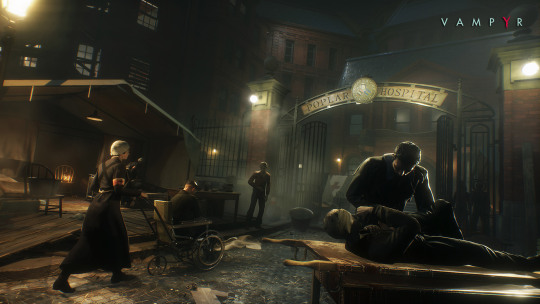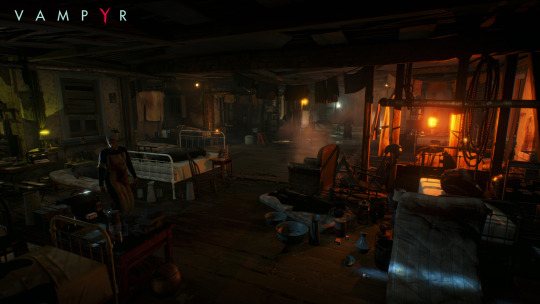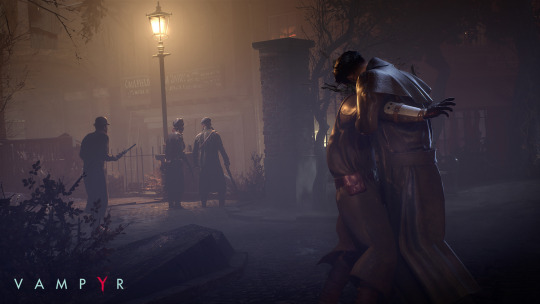#deeply damages the story structure and the quest load out
Text
Vampyr presents a compelling, if flawed, post-WWI vampire story

by Amr (@siegarettes)
Vampyr
Developer- Dontnod
Publisher- Focus Home Interactive
PC, PS4, Xbox One
I love being proven wrong. After doing this for a while you get a sense for how a game will generally turn out, and everything I'd seen of Vampyr didn't give me much confidence. There was plenty of promises of meaningful choice and interlocking systems, big words that more often point to overambition than anything else. Vampyr definitely doesn't escape that overambition. There are many rough edges--abrupt loading screens within open areas, dialogue playing over itself, oversights inside of main quests--these are only a few of the things that point to Dontnod reaching beyond their resources.
Despite that Vampyr has been surprisingly compelling. Its focus on conversation and investigation gives weight to the web of relationships within its cast. Character dialogue is limited, but the process of tracking down people, learning about them, and slowly coming to a greater understanding is deeply satisfying. Characters have tangible histories, and I often found listening to them tell their own stories as engaging as following my own.

These stories also give Vampyr space to address various social issues within the post-World War 1 period it takes place in. Often vampire fiction can fall into the trap of creating fantastical worlds that feel ignorant of the loaded history their period aesthetics draw on--despite the vampire's mythological origins as a reflection of social ills. Vampyr feels surprisingly cognizant in that regard. It brings together a diverse cast with their own concerns, and manages to address issues of race, class, and the period's global politics in a way that enriches the fiction.
Less interesting is the combat, which uses a stamina based system alongside a suite of blood based powers. Melee weapons are the primary damage dealers and offhand weapons like guns or stakes can be used to inflict stun damage, opening them up to be drained of blood. Blood can be used to heal or power special attacks like your claws or shadowy vortexes that entrap enemies. Each of these weapons inflicts a certain type of damage, and you'll need to apply them appropriately to efficiently take down enemies. It brings to mind The Surge, with its focus on weak points and building special resources, though Vampyr feels much stiffer. Combat is at its best when it gives you a mix of enemies that demand use of all those abilities. That's rare, and outside of certain boss encounters you won't be pushed far.

Vampyr never allows you to let loose, either. Combat is restricted to designated areas, and sucking a character's blood has its own requirements and procedures. You can't feed on them out in the open. No, that's simply not polite. Instead you investigate them, learn their life story--which increases the XP they'll award you, make sure that your Mesmerize level is high enough by doing story missions, then lead them off to some dark corner where you can do the deed unobserved. Your character wants to stay hidden and that means avoiding openly antagonizing the citizens of London.
It creates a harsh delineation between investigation and combat. Learning about these characters feeds into the growth of your vampiric abilities, but aside from story missions which increase your Mesmerize level, all of these abilities are for combat. Which is strange, since despite the huge skill tree, the combat is never more than a secondary concern. Most of the time enemies are only there to lend an area a sense of danger, forcing you to feed on citizens to even out the discrepancy in ability between you and the enemies. It's effective enough, but the sheer amount of options focused on combat is strange since Vampyr clearly cares more about its web of relationships and narrative threads. So it ends up without the freedom to be openly predatory, which would make a combat focus make more sense, or alternative conversational skills to spend your XP on.
What ends up being the best argument for feeding on citizens are the epiphanies they bestow on you. Feeding on them will give you a flash of their memories, providing clues about related characters that open up new conversation options. Of course, this means you've also killed a connection, causing consequences to resonate throughout the social structure. It ended up putting me in a situation where I'd kill a certain character, then end up chasing down their connections to feed upon as well, who'd reward me with even more XP thanks to the new information I'd gained. The limits of this chain show themselves quickly, since I'd inevitably reach a character too strong of mind to mesmerize. It's a clear choice to prevent you from derailing the entire narrative, but it is another limit on your agency.

Another problem on that front is the way Vampyr telegraphs, or fails to telegraph, the outcomes of your choices. Whereas Dontnod's previous game, Life is Strange, allowed you to rewind and try options multiple times before picking your final response, Vampyr makes clear every choice is permanent. There are no alternative save slots, and each choice is immediately recorded. It's admirable in a way, but it quickly made clear the problems with that choice within the opening hours. Choices can be misleading in what their effect will be on a character, leaving me with the feeling that my intent was not communicated. One early quest in particular ended up with me doing exactly the opposite of what I wanted, and everyone else I talked to about that moment walked away feeling the same way.
Life is Strange avoided these problems by letting you immediately backtrack if the response was unexpected, which ironically made it easier to own the choices you made. Vampyr, by contrast, ends up in situations where I felt cheated, having to live with consequences not of my actions, but of a frustrating miscommunication from the game.

These frustrations have dampened my enthusiasm for the game a bit, but Vampyr remains compelling despite them. Time will tell how deeply those stumbles come back to bite me.
6 notes
·
View notes
Text
Adventure basics module 0 ~ the zen paradox crash course via Alan Watts
The first version of this is 4 hours and a half, nearly. Here are the notes from the stream session where I ran the entire playlist. 1- there isnt anything else to think about except here and now. thinking about the future has no value, its value is an illusion, bc future is an illusion. 2- skull glee "laughing everlastingly []~[] death was but the good king's jest, it was hid so carefully " 3- to stop clinging to the value of survival, practice thinking deeply about what is real. something that happens "only once" doesn't happen at all. there is not just one cosmos. all stopping implies starting. 4- we're looking at the terror that nothingness may "Win" this game. it's something to look at, as we look at stories in the arts. 5- Watch This: what happens when accomplishing Shutting up 6- the point of anything is arrived at Only in the moment. Now. 7- the point is... Play. Enjoyment of the Vibe of now. 8- you don't have to try to understand anything. you just listen to the sound. but you can't help naming what is heard and seeing thoughts appear which are words. Listen to them, they are part of the total general noise. 9- how to contact your higher self - no, it contacts you. all you do is Watch This. You are here. Now. 10- we are gonna figure out some paradox states that deal with what it means to stop Wanting to do Good / be better. 11- this question is, how can i outwit Me ? The quest for satisfaction just changes, what is Good just changes as we quest. 12- why do you want to know about Becoming better? Doing good even to oneself can be amazingly destructive. How do you know what's good for you? 13- we are going to pay for all of the improvements that have been made as we have interfered with nature. until we have become a plague of virtuous people, all in all. 14- watts and carlin both manage to describe how humanity is absolutely horrifying as soon as it's more than one, more than an individual virtue. ()hour 2 begins 15- with the most elementary lesson. about sensation, the core dual aspect of On / Off, vibration. life is this system of now you see it, now you don't. 16- here, we are beginning truly to describe universe symmetry, mutual arising, and the negative principle. particles of truth we are going to see about absolutely all things. 17- there is no road to here, because you're already there. we are all here. Now. 18- all of the observable energy / electricity transactions have to do with a circuit closing point. the motion doesn't start until the circuit closes. it takes time for the circuit to form, then time for the energy to transfer. 19- we are in the nature of god segment, which gets us to consider how the Father Authority figure is a problematic culture element of religions other than those of Zen. -this segment is about the thought that there IS authority to existence - and it's NOT you. 20- the page that words are written on, the space wherein dance and music unfolds, fabric, the Sub Stance. Underneath. existence is Being this substance. -COnsciousness thereby represents the most Elusive Whatever it is that we know about 21- the BLANK is absolutely necessary for there to be Anything. The []Kali is representative of horrible, unthinkable badness. We have made death scary with monsters. 22- The []coincidence of opposites - basically what a mutual arising construct is. Zen Paradox. 23- Neti Neti. THE void. God who has No image. 24- Not formal atheism. The luminous Darkness. Total trust attitude, letting go. REAL paradox zen. 25- The ability to STOP chasing fulfillment and instead inhabit the only Anything that there is. Now. 26- We are always in a hurry to get things finished, and so the things that we finish weren't worth finishing 'cause they were done so fast.* 27- We don't have TIME to sit... to sit and listen to the water. REally? I've been questioning this since like age 3. 28- at 2 hour mark -we are going to think about work as play, everything as play, the concept of accessing our spontaneity. 29- now we fully weigh what does it mean to untie the knot that coercion thought patterns is. it's not necessary to go on living. raising all the kids to think of their Duty to go on makes everyone miserable. 30- the disruption against coercion, it is like parable. slyman, the joker. Scoundrel, ourselves. 31- there is no way out of the bind of doing any actions but not thinking of them first.... [ THIS is a zen paradox structure I first encountered when it was about how the characters in hitchiker's guide to the galaxy learn Flight.[] 32- This is going through a door, then turning around and seeing there was never a door. You're not trapped. You just step over the prison. [] ()third hour beginning, some comedy about zen masters now 33- the zen student is one who has checked out of the status game. focusing on the real value of reality and sensation instead. 34- it takes two to make a quarrel. 35- Zen cannot be explained - you have to use words to describe within a language that it has a limitation. the limitation is what we are trying to describe. 36- Watts directly calls out the trauma caused by coercion in childhood and education. No subtlety about how prepared are we to undo the damage caused to kids by education. 37- mutual arising is the evidence of the difference between absence, Tone, decay back to its absence. it's a stone falling into liquid 38- Sensation is the good term to directly refer to real existence content. 39- to be awake is to be watching existence, watching the vibration. to see the spontaneous action after succeeding at not inhibiting it. - and everyone has the ability to wake up from the illusions to instead just watch real existence, the basic energy sensation in the core of all. 40- Ego is a social institution, like words are a Noise to indicate something that exists. 41- if you would like to be anxious it's alright, you can, you don't have to chill. but if you get to the point u no longer enjoy the game, you don't have to do it. 42- the whole fun within a game is you don't know the whole outcome. watts explains this regarding life. an aesthetic about trusting the game is the core Play attitude he is trying to teach. 43- you cannot take the risk out of human connections and social goings on. it becomes impossible. 44- Secure "safety" where whole system "Watches" itself, elaborately self conscious - surveillance state, you are tied up in that process and literally cannot act. Halted. To have freedom, Risk is present. A community that doesn't trust itself does not function to wellbeing or chill. 45- last few segments on this playlist are the Structure built out of the prior particles. Upper level. about social systems, currency, interaction, and Love itself. they are about sharing and Sovereignty of the WHOLE which requires the framework, the mesh vibration. 46- he totally takes the time to rip on rushing around in automobiles. it's stupid. hurrying is so completely LAME, and so is being furious. 47- he literally describes that its absurd for money to be issued out then re collected in tax. the system would be simpler to be a money issuing system to install spending power across the population, while first keeping what budget needed. -that distro failure is where we are now in dehumanism system. we've generated a shit load of revenue on behalf of people, using the tech, but that gain has been hoarded and used in ways that have ruined the Mesh of our human community. instead of distributing the gains to humans' behalf.
0 notes